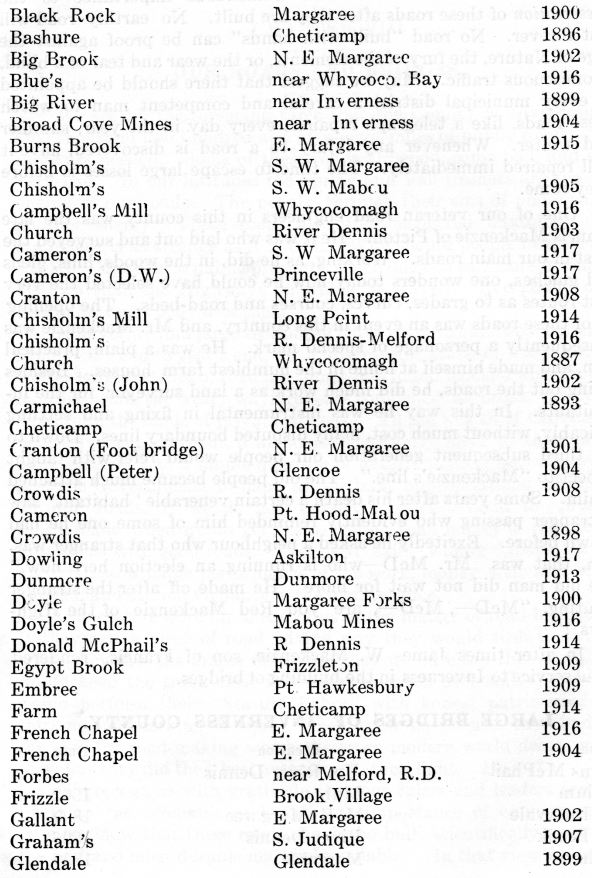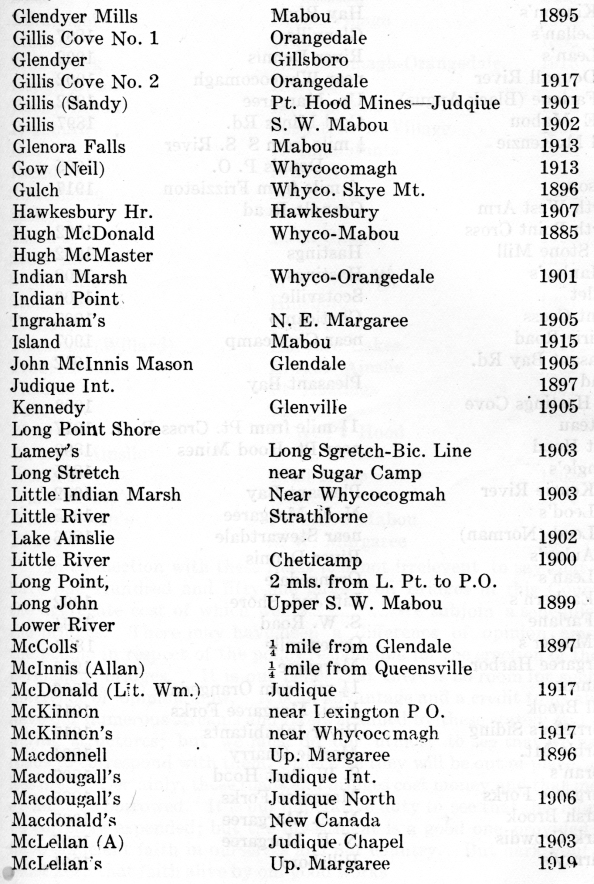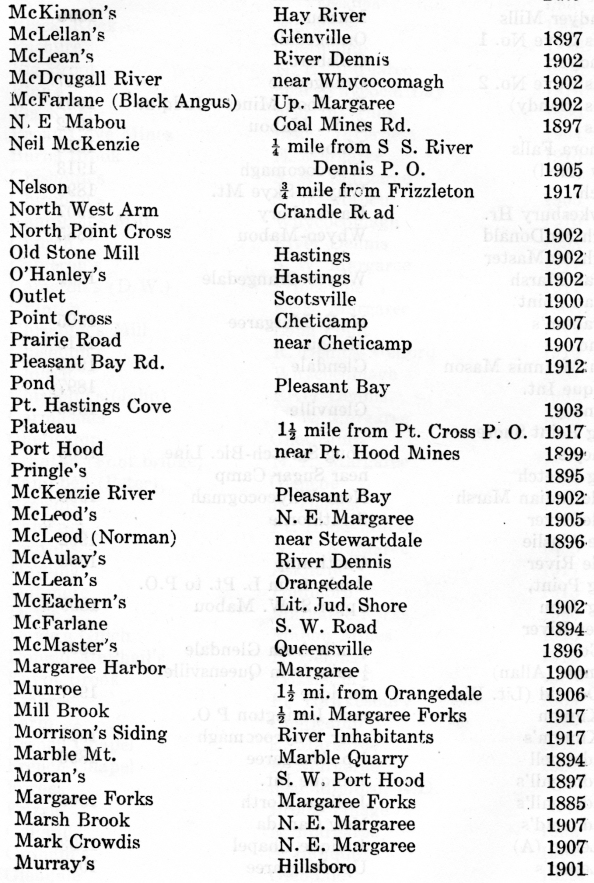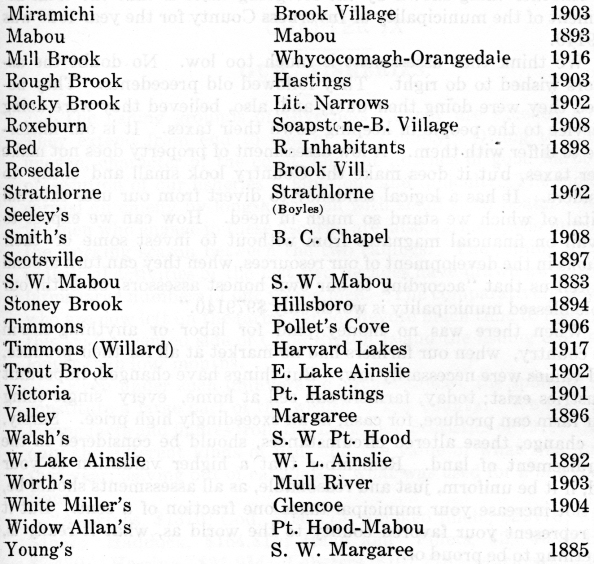|
We see by the foregoing
table that the County of Inverness has One thousand two hundred and
fifty-eight miles of public roads. And more are needed. Some of these
roads are good, some bad, and some very bad. In our latitudes the Spring
and Fall freshets are the chief enemy of our roads. The people, through
their sins of omission, are another enemy. These roads are often neglected
wantonly. This statement is as strange as it is true. Why should people
neglect their roads? There is no public property which one can call more
intimately his own than the Highways on which he travels. Everybody needs
the roads; everybody uses them.
And yet, we find large
sections of these roads are allowed to remain from year's end to year's
end, in a disgraceful state of disrepair. In winter long stretches of road
are sometimes found blocked with snow for months, while the weary
wayfarers are compelled to break the fences and injure the lands of
private citizens. All the wealth of Croesus will never give us good roads,
if we be not constantly alive to their proper maintenance. As a simple
question of natural justice, how can we expect the Governments to hand us
out large appropriations of money for our roads, if we do not, ourselves,
raise a hand to preserve those roads when we do get them. More than money
is required to provide us with good roads. We need skill, willing labour,
proper material, seasonable performance of the work, money well and wisely
applied, and eternal vigilance in the maintenance.
Our ancestors were far
ahead of us in the matter of road husbandry. If they saw a piece of road
giving way they would rush to save it; when they saw the drains filling
up, they would clean them out; they would keep the track clear in winter,
as much as possible; and they would perform their "Statute Labor" with
honest patriotism. No shirking, no marking of time. They knew no science,
they had not the skill for road-making which the more modern world deems
necessary, but they did their best according to their light. Do we?
We recognize with gratitude
that our rulers and leaders are now rising to the economic and civilizing
importance of country roads. It is felt now that these roads should be
built scientifically, and with the best and most durable material
available. In that view we concur without reserve. But we attach
tremendous importance to the preservation of these roads after they are
built. No earthly road will last forever. No road "built with hands" can
be proof against the rage of Nature, the fury of the elements, or the wear
and tear of a blind, promiscuous traffic. May we suggest that there should
be appointed in every municipal district a careful and competent man to
watch these roads, like a telegraph repairer, every day in the year,
summer and winter. Whenever any injury to a road is discovered, have it
well repaired immediately. The time' to escape large losses is before they
come.
One of our veteran road
engineers in this county was the late Francis Mackenzie of Pictou. He it
was who laid out and surveyed the most of our main roads. Working, as he
did, in the woods, hills, glens and gulches, one wonders today how he
could have selected the very best routes as to grades, curves, courses and
road-beds. The opening up of these roads was an event in this country, and
Mr. Mackenzie was consequently a personage of special mark. He was a
plain, practical man, and made himself at home in the humblest farm
houses. Besides laying out the roads, he did much work as a land surveyor
for the inhabitants. In this way he was instrumental in fixing and
settling amicably, without much cost, many disputed boundary lines. Down
to the third subsequent generation our people would refer with taught
respect to "Mackenzie's line." The old people became much attached to him.
Some years after his death a certain venerable' habitant" saw ;a stranger
passing who evidently reminded him of some one he had known before.
Excitedly he asked a neighbour who that stranger was. "Oh, that was Mr.
McD - who is running an election here now." The old man did not wait for
more He made off after the stranger shouting, "McD-, McD-, are you Red
Mackenzie of the Highways?".
In after times James W.
Mackenzie, son of Francis, rendered useful service to Inverness in the
building of bridges.





In connection with these
roads it is not irrelevent to say that we have one Hundred and fifty-one
large Iron Bridges in this County, the aggregate cost of which was $....
We subjoin a schedule of the bridges. There may have been a difference of
opinion among the people in respect of the policy responsible for the
erection of those permanent bridges. It is our belief that there is no
room for such a difference of opinion now. It is an advantage and a credit
to us all to have our numerous streams and rivers spanned by these stately
and enduring structures; but we must do our utmost to see that we have
roads to correspond with them. Otherwise they will be out of place, and
less useful. Certainly, these roads and bridges cost money, and that money
must be borrowed. It is our imperative duty to see that this money be
correctly expended; but the investment is a good one, provided we have
sufficient faith in ourselves and our country. But hark you! we must keep
that faith alive by our good works.
Another thing shown by the
foregoing table is that the total assessment of the municipality of
Inverness County for the year 1920 was $979,140.
We think that assessment is
much too low. No doubt the assessors wished to do right. They followed old
precedents. They believed they were doing their duty, and, also, believed
they were doing a service to the people in keeping down their taxes. It is
our misfortune to differ with them. A low assessment of property does not
make lower taxes, but it does make the Country look small and cheap to
outsiders. It has a logical tendency to divert from our uses external
capital of which we. stand so much in need. How can we expect to prevail
on financial magnates from without to invest some of their millions in the
development of our resources, when they can turn around and tell us that
"according to our own honest assessors, on oath, our whole blessed
municipality is worth only $979,140."
When there was no money
paid for labor or anything else in this country, when our farmers had no
market at all for their produce, land values were necessarily low. But
things have changed, important industries exist; today, farmers can sell
at home, every single thing their farm can produce, for cash, at an
exceedingly high price. Surely, this change, these altered circumstances,
should be considered in the appraisement of land. Remember that a higher
valuation of your land, if it be uniform, just and reasonable, as all
assessments should be, will not increase your municipal taxes one fraction
of a cent. But it will represent your favored county to the world as, what
it really is, something to be proud of. |
